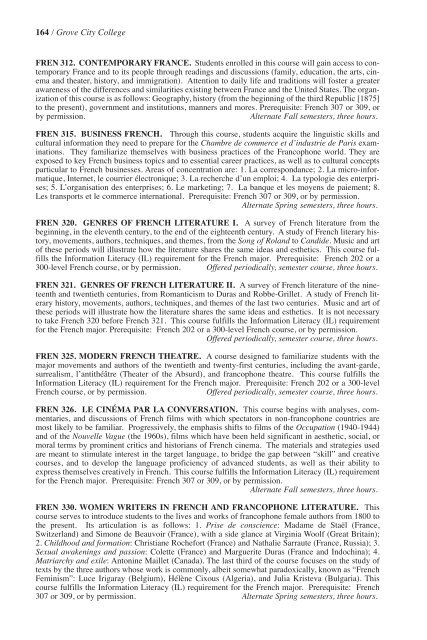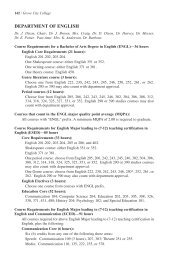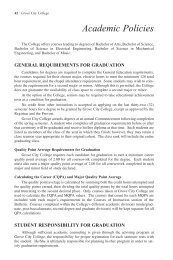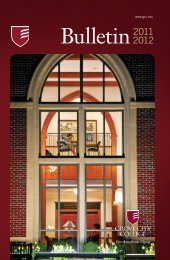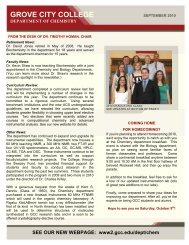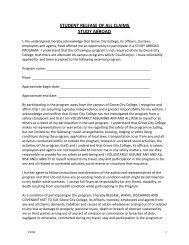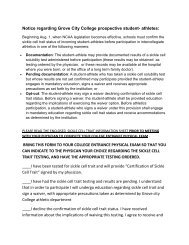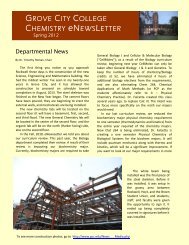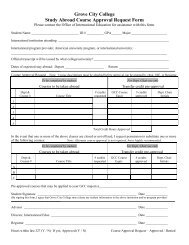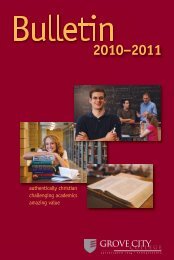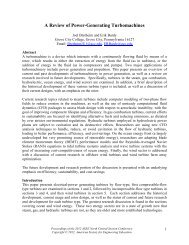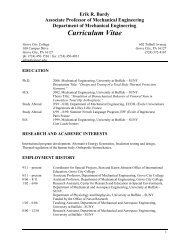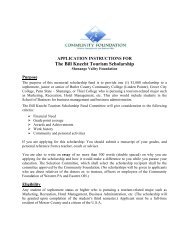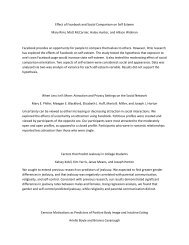2009–2010 - Grove City College
2009–2010 - Grove City College
2009–2010 - Grove City College
Create successful ePaper yourself
Turn your PDF publications into a flip-book with our unique Google optimized e-Paper software.
164 / <strong>Grove</strong> <strong>City</strong> <strong>College</strong><br />
FREN 312. CONTEMPORARY FRANCE. Students enrolled in this course will gain access to contemporary<br />
France and to its people through readings and discussions (family, education, the arts, cinema<br />
and theater, history, and immigration). Attention to daily life and traditions will foster a greater<br />
awareness of the differences and similarities existing between France and the United States. The organization<br />
of this course is as follows: Geography, history (from the beginning of the third Republic [1875]<br />
to the present), government and institutions, manners and mores. Prerequisite: French 307 or 309, or<br />
by permission. Alternate Fall semesters, three hours.<br />
FREN 315. BUSINESS FRENCH. Through this course, students acquire the linguistic skills and<br />
cultural information they need to prepare for the Chambre de commerce et d’industrie de Paris examinations.<br />
They familiarize themselves with business practices of the Francophone world. They are<br />
exposed to key French business topics and to essential career practices, as well as to cultural concepts<br />
particular to French businesses. Areas of concentration are: 1. La correspondance; 2. La micro-informatique,<br />
Internet, le courrier électronique; 3. La recherche d’un emploi; 4. La typologie des enterprises;<br />
5. L’organisation des enterprises; 6. Le marketing; 7. La banque et les moyens de paiement; 8.<br />
Les transports et le commerce international. Prerequisite: French 307 or 309, or by permission.<br />
Alternate Spring semesters, three hours.<br />
FREN 320. GENRES OF FRENCH LITERATURE I. A survey of French literature from the<br />
beginning, in the eleventh century, to the end of the eighteenth century. A study of French literary history,<br />
movements, authors, techniques, and themes, from the Song of Roland to Candide. Music and art<br />
of these periods will illustrate how the literature shares the same ideas and esthetics. This course fulfills<br />
the Information Literacy (IL) requirement for the French major. Prerequisite: French 202 or a<br />
300-level French course, or by permission. Offered periodically, semester course, three hours.<br />
FREN 321. GENRES OF FRENCH LITERATURE II. A survey of French literature of the nineteenth<br />
and twentieth centuries, from Romanticism to Duras and Robbe-Grillet. A study of French literary<br />
history, movements, authors, techniques, and themes of the last two centuries. Music and art of<br />
these periods will illustrate how the literature shares the same ideas and esthetics. It is not necessary<br />
to take French 320 before French 321. This course fulfills the Information Literacy (IL) requirement<br />
for the French major. Prerequisite: French 202 or a 300-level French course, or by permission.<br />
Offered periodically, semester course, three hours.<br />
FREN 325. MODERN FRENCH THEATRE. A course designed to familiarize students with the<br />
major movements and authors of the twentieth and twenty-first centuries, including the avant-garde,<br />
surrealism, l’antithéâtre (Theater of the Absurd), and francophone theatre. This course fulfills the<br />
Information Literacy (IL) requirement for the French major. Prerequisite: French 202 or a 300-level<br />
French course, or by permission. Offered periodically, semester course, three hours.<br />
FREN 326. LE CINÉMA PAR LA CONVERSATION. This course begins with analyses, commentaries,<br />
and discussions of French films with which spectators in non-francophone countries are<br />
most likely to be familiar. Progressively, the emphasis shifts to films of the Occupation (1940-1944)<br />
and of the Nouvelle Vague (the 1960s), films which have been held significant in aesthetic, social, or<br />
moral terms by prominent critics and historians of French cinema. The materials and strategies used<br />
are meant to stimulate interest in the target language, to bridge the gap between “skill” and creative<br />
courses, and to develop the language proficiency of advanced students, as well as their ability to<br />
express themselves creatively in French. This course fulfills the Information Literacy (IL) requirement<br />
for the French major. Prerequisite: French 307 or 309, or by permission.<br />
Alternate Fall semesters, three hours.<br />
FREN 330. WOMEN WRITERS IN FRENCH AND FRANCOPHONE LITERATURE. This<br />
course serves to introduce students to the lives and works of francophone female authors from 1800 to<br />
the present. Its articulation is as follows: 1. Prise de conscience: Madame de Staël (France,<br />
Switzerland) and Simone de Beauvoir (France), with a side glance at Virginia Woolf (Great Britain);<br />
2. Childhood and formation: Christiane Rochefort (France) and Nathalie Sarraute (France, Russia); 3.<br />
Sexual awakenings and passion: Colette (France) and Marguerite Duras (France and Indochina); 4.<br />
Matriarchy and exile: Antonine Maillet (Canada). The last third of the course focuses on the study of<br />
texts by the three authors whose work is commonly, albeit somewhat paradoxically, known as “French<br />
Feminism”: Luce Irigaray (Belgium), Hélène Cixous (Algeria), and Julia Kristeva (Bulgaria). This<br />
course fulfills the Information Literacy (IL) requirement for the French major. Prerequisite: French<br />
307 or 309, or by permission. Alternate Spring semesters, three hours.


